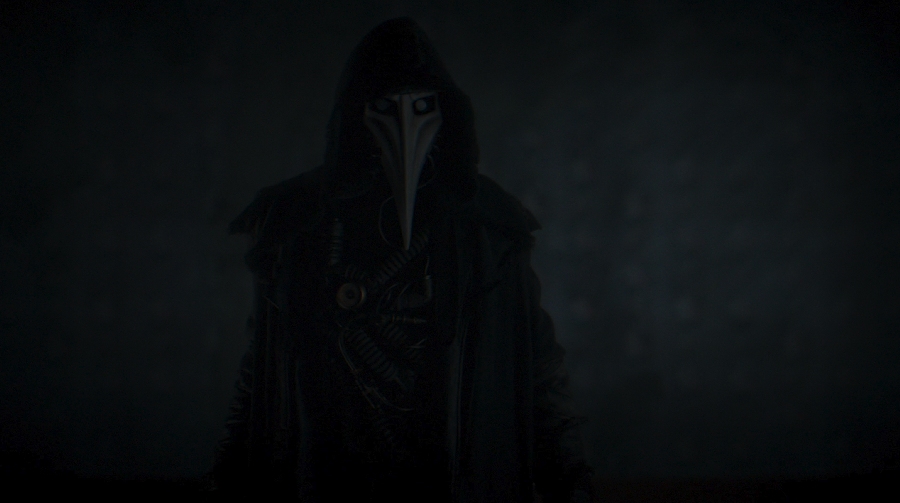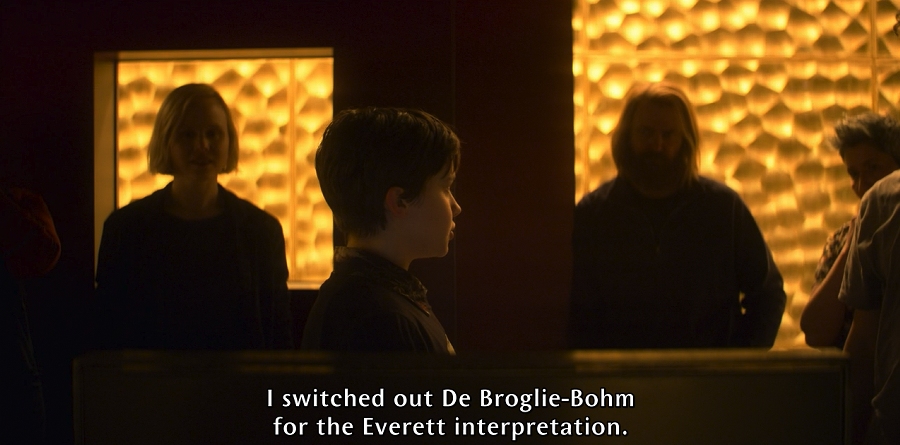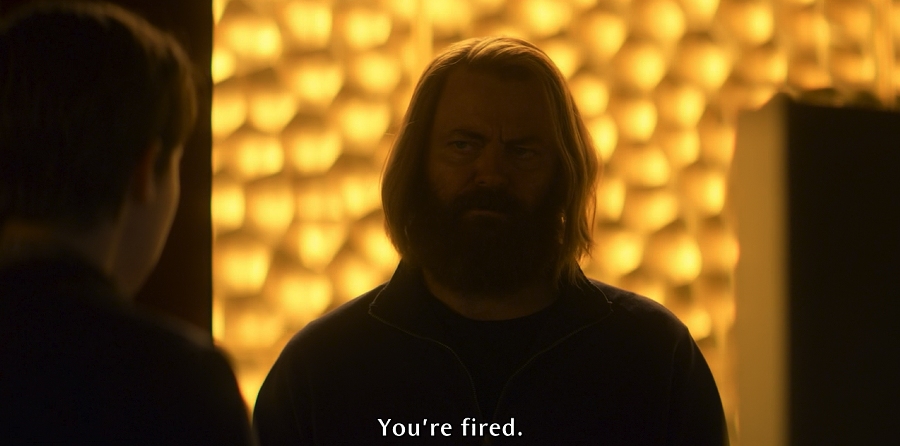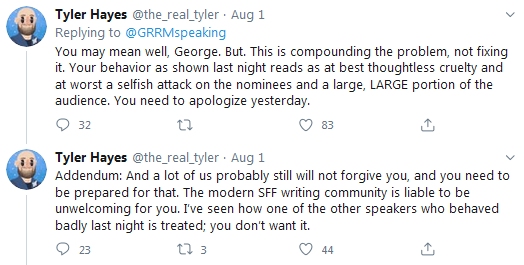
Why did I decide to watch this after Dark?
Sometimes it’s fun to track a pattern: I saw a tweet by Stephen King.
“DARK (Netflix) is dark and complex…and…well…very German. Terrific show. If you get confused, go to MetaWitches and check out Metacrone’s recaps. Detailed and helpful.”
So I check this “MetaWitches” website, only to find out that, at the time of my checking, it didn’t actually cover Dark’s last season. I was looking for different opinions on the ending, so it didn’t help. But the part I read had this:
“While you wait for Dark recaps, I recommend The OA, Twelve Monkeys, Orphan Black, Travelers and Fringe if you haven’t seen any of them already. Agents of SHIELD and Snowpiercer are also good. Twelve Monkeys is probably my favorite time travel show ever, with the most well done ending of all time. Yes, I said it. Orphan Black has a lot more in common with Dark than you’d think at first. I might be convinced to do recaps for 12 Monkeys or Orphan Black someday, if enough people were interested.”
…So, why not?
I had seen the first two episodes of 12 Monkeys back then when it started, and gave up. This time I’ve seen the whole thing.
While I didn’t end up with a good opinion about The OA, Fringe was okay to good (with some occasional brilliant moments) for the first three seasons (I think?), and Travelers truly excellent all the way through. Agents of SHIELD doesn’t belong to this list, and is more a rollercoaster going up and down, but it is quite entertaining and sometimes even rather good for the first three seasons, but I dropped it at the beginning of the fourth because I couldn’t tolerate anymore Skye (everything, from character to actress), downright unwatchable. 12 Monkeys… isn’t entirely shit, and it indeed has some cool stuff.
Let’s see. The first season starts bad. It’s barely watchable and the reason why I immediately dropped it the first time. It’s silly entertainment but too “cliche” to be worth it. But now I have a broader picture. As it goes on and more pieces are being added, the first season gets better. It grows, it becomes more interesting and ultimately it gets relatively fun to watch. But I then met another minor roadblock because the 1st season finale is instead terrible. The slight reset at the beginning of the second season meant I lost all the momentum that the first season gave me, and after the first episode of the second season I was already thinking about dropping it again.
…But I continued anyway, and as it happened with the first season, the more it kept going the more it improved and became interesting. This thankfully continued through the third season, that sailed pretty well, and leading to the fourth and final without losing anymore that momentum. The problems start again with the fourth. The first half doesn’t suddenly drop the momentum, but it gets boring as they go through rather pointless sidetracks. There are good isolated moments, here and there, but everything descends into utter silliness and lots of the same already seen. On paper it might be fun: hey, we got time travel, why not going to the Middle Ages with cool looking armors and swords? Alright, but it’s beginning to show it’s done “just so.” And signs of strain all over the place. Tiring, aimless, filler. It tries to find freshness by moving around, but finds none.
And then… “the most well done ending of all time.” Oh, wow.
The last few episodes of the last season and especially the finale, are UTTER SHIT. It’s just garbage and it’s not an “opinion” or some sort of philosophical disagreement as in the case of Dark. The finale is just ridiculous on the most banal level: it makes Michael Bay’s Transformers look like refined taste.
I mean, the whole show is rather cheap entertainment with silly action scenes and not much pretense. It is what it is, and as I said there’s good stuff (I’ll get to that). The finale, though, is like a stupid version of Lord of the Rings mixed with the worst of Star Wars, copied scene by scene but in a way that just makes it fail even as unpretentious entertainment. It’s EMBARRASSINGLY BAD. And this isn’t some very personal controversial opinion, I think most of everyone who watches it would agree. It doesn’t need any sort of insight or sophisticate sensibility to recognize it as the garbage it is. I could even start posting here direct screenshots from the finale to conclusively prove that point without any other context necessary. Take the very worst of Star Wars, strip the epicness, and leave all the ridiculous tropes, that’s all there is. And people hugging and looking sad for interminable moments.
In general, the finale of this show is so bad that I cannot quickly find something I watched that I can consider worse, or even comparable. It’s the worst I’ve ever seen. The closest comparison I can find is “He-Man and the Masters of the Universe” levels of cringe, but even this would have its own merits (as a product of its time).
I’m of course not a movie critic and I don’t write movie reviews here. I deal with themes and concepts, and other stuff I care about. The finale of 12 Monkeys is garbage at the level of movie product, not for the lack of depth of its concepts. But even its concepts completely fall apart on the finale. So I’ll briefly focus on that aspect.
The general setup of the show is that there’s a plague that kills 7 billion people, and in the future they try using a time machine to go back and prevent the plague. Of course it also happens that they often try and fail, only finding out they inadvertently cause something instead of preventing it. Although, it is actually established early in the show that the future indeed changes. Time is somewhat resilient to change, but with enough of a push there are various smaller instances where they manage to trigger a difference. Through the seasons, you obviously also get a love story between the two protagonists.
So what do you expect from a basic level of entertainment where an happy end is guaranteed? Well, they will eventually, after four seasons, get to prevent the plague. No one is surprised about that. And everyone will be happy, including the two protagonists and their love story.
The problem is how they get there, and thankfully all the shit in the whole show is only concentrated in the last few episodes. Everything else is fine.
The problem they have to solve at the very end, beside all the pointless action scenes with them breaking into Mordor/Death Star, shooting and killing all the redshirts, and eventually murder Sauron/Palpatine too (in a scene that is “Revenge of the Sith” but done so much worse that demands to be seen for all the wrong reasons)… the problem is that to fix the plague they also have to “remove” the protagonist. You know, the pattern of Donnie Darko, and now Dark, where a sacrifice has to be made in order to restore order and normality in the world. So the protagonist has to be erased because this erasure is what makes possible the solution of the initial issue, the plague and everything else that is bad (similar to the “knot” in Dark, with the difference that here everyone who belongs to the knot happens to be evil).
And that’s what happens. The protagonist is erased, and with him the whole “journey” of the show itself. We see an aftermath where (after apocalyptic scenes where the whole earth literally blows up) a new timeline is produced. The plague is gone and we see EVERY dear major character, including those who died through the show, once again alive and now so happy. No one remembers anything, it’s a new world where everything is super great.
But this leaves the problem of the “love story.” Because the protagonist was erased, and the damsel doesn’t remember him in this new timeline. That won’t do.
So, the final revelation is that the protagonist has been transported to the new timeline as well. The motivation for this is straight to the point, without even trying to disguise it: it’s said that reality has its rules, and what are rules if you can’t break at least one? They gambled with time through four seasons, so what’s another one?
As in Dark, the idea is that the time-travel machine might as well work as meta-travel: if you can travel in time maybe you can travel to other dimensions too. So they produce a new timeline, make the protagonist travel to the new world, and because he’s the same protagonist who’s traveling, he retains all his memories. He not only doesn’t get erased, but he’s the only one who STILL remembers all that happened. It’s a mirror of Dark because in this case the real anomaly is produced instead of solved. The protagonist shouldn’t have been born in this new timeline, but he was moved there, and now he exists.
But this still leaves the problem of the love story. He’s a guy who remembers everything, but in love with a woman who doesn’t even know anymore who he is? That’s too bittersweet for this kind of show. So what happens? …She has a deja-vu and somehow remembers everything. The power of love that survives through different dimensions makes her remember everything.
That’s the whole thing: a fresh timeline is produced without the plague, the protagonist is the only one to remember because he meta-travels to the fresh timeline, and his love interest is made to remember through a magical deja-vu produced by the power of love.
Alright.
I don’t even know here if, brushing aside the silliness, the whole thing holds up or not on a basic level. This show is all about hand waving, silly characters’ motivations and stuff like that. It barely holds together but it’s generally fine as an unpretentious piece of entertainment. But I’m left with some questions, that probably lead to major holes that are very similar to Dark when you take them apart to see the inner workings.
As I said, here time travel is shown to produce new futures. You go back, change something, and something changes in the future too. In general one quotes chaos theory, the butterfly example. In the show they are aware of this, constantly repeating that they have to be very careful when going back, because some minor change might instead produce some major change and completely shift the course of history. And yet… This only exists in theory. By the time they reach the final season they jump through time with scores of people, guns a-blazing, killing everyone who happens to look the wrong way. No shit given.
But there are occasions where even death is avoided by going back and doing something different. The problem is that here, as in Dark, they want to have both things at once: a timeline that preserves itself and that can change too. This is weakly motivated by making “time” anthropomorphic, so there are certain things that can be easily shifted, and others that “time”, as an actor, demands going in a certain way. This is even validated, not simply perception, so it is said that “time” doesn’t like the time machine. It gives bad vibes. Time demands things, has certain desires.
It’s okay, it’s banal metaphysical hand waving without much pretense. The rules are silly but what is important is that the show sticks to them. “Time” as a sort of “will” is certainly not “hard” science fiction, but it might as well be the premise to accept here.
The problem is again they make a mess “knotting” the two concepts. And to figure out if “it works” or not would require an effort in un-knotting comparable to Dark, and this show certainly doesn’t deserve as much effort. So I’m not quite sure of the result.
The problem essentially is the same as in Dark: the origin of the protagonist is revealed to be in the future. Creating the same “knot” as in Dark where the future ties back to the past. And in the EXACT same way, the time anomaly is eventually removed to restore order to the world. In the same way, removing the anomaly ALSO removes the possibility of time travel itself, fully Donnie Darko. A loop is closed, falls off. It never existed.
But here we are in a context where time travel DOES produce change. It’s hard to, but it’s possible. Causality isn’t broken here, and it’s why all the way to the end 12 Monkeys works more elegantly than Dark. There are no silly paradoxes (well… conceptually).
BUT… the protagonist’s origin is the END of the last cycle. And this doesn’t make any sense. If we are in a context where time travel produces changes, then it’s mean the story starts at “A”, you travel back, trigger some change, so the timeline produces a divergence “B.” If you then go back again, produce some new change, you create a timeline “C”, and so on. The problem here is that the protagonist’s mother in “A” is only alive at the end of the journey, in “Z.” There is absolutely nothing in this show that introduces meta-traveling between timelines, they only run linearly from the previous to the next. So… There’s no logical explanation how the protagonist can be born, in “A”, if his mother is only alive in “Z.”
There is a confusion that this show never explains, and here too leads to contradiction. Sometimes time travel “causes” the events as they are known (same as in Dark), some other times time travel produces divergent timelines. For example, one of the last plot twists is that the plague is released voluntarily by the protagonists! So the real cause of the plague has always been them! Weirdly enough, this sounds incredibly silly, and yet it’s one of the points that work BEST logically (the ultimate enemy at that point is “outside” the timeline and wants to destroy the world, if they avoid the plague they lose the time machine, so they have nothing to fight back, and so they need to cause the plague to still keep “pursuing” and have a fighting chance).
I don’t know if it’s possible to disentangle this, it’s like splintering timelines are folded into one that is absolute and fixed. But this cherry picking about what can change and what cannot is just that, convenient cherry picking for dramatic effect.
They straddle and ride this ambiguity. For example, the mistake is plain in the last season where what happens is the opposite of what I just described. They know the same history as we do, they go back, they kill Hitler. Because why not. They move from a timeline similar to ours, to a timeline where Hitler is killed earlier. The meaning of this in the show is that nothing changes substantially: Hitler is replaced by Himmler who, in the logic of the show, is no better than Hitler, so proving that killing Hitler wouldn’t have produced any meaningful change. The course of history repeats with just that “minor” death.
But this automatically means they have two timelines. One as we know it with Hitler dead in 1945, the new one where Hitler is dead in 1940. Just because this death doesn’t produce any macroscopic consequence doesn’t mean the timeline didn’t shift. It’s a TOTALLY NEW timeline that just happens to take a similar course, but it’s CLEARLY not the same one. And okay.
The problem is, if you keep producing new timelines, how it’s possible that the MOTHER of the protagonist, a protagonist that already exists before time travel starts to happen, that mother only exists at the LAST timeline? How can the protagonist exist if at the original timeline his mother wasn’t there? Again, this can only be explained if instead of time-travel you have meta-travel: not traveling to a different *time* in the same timeline, but traveling to different (previous) timelines. That’s something they explicitly do during the finale, because they send the protagonist forward to the new timeline. But it’s the very first and only time it happens, so it doesn’t explain all the other cases (and there are many).
In conclusion 12 Monkeys is a radically different show from Dark, but ends up replicating the same problems with its concepts. It’s like a different angle on the same thing, and the more you dig the more you realize they work the same. In both, time travel is created and triggers all kinds of woes, and again in both the solution requires to remove time travel as an anomaly to restore order. In both an ultimate sacrifice is required, an erasure, but in 12 Monkeys then withdrawn in service of happy end. In both we see a time cycle that seems eternal and unbreakable, but both eventually introduce convenient “exceptions” to break it.
There are good things, tho, especially in the second and third season. The whole show is built on the concept of “Your Princess Is in Another Castle”. They think doing something can prevent the plague, like killing a specific bad guy, so they go back, kill the guy, only to find out he wasn’t the whole deal. But even if we have four seasons of this pattern constantly repeating, exactly the same… it works. Every time they go back, and fail, it’s not simply a reset. That would be pointless and frustrating. Instead knowledge grows. We don’t have information made invalid and constantly replaced, we have information that integrates information. They go in blind, because they have nothing to work with, but every time they acquire a new piece, and these pieces are assembled together to generate bigger picture. The sense of frustration is mitigated because this is a journey of discovery.
Knowledge is never sufficient, but it creates at least an illusion of progress. In this, they recreate something valid at its core. Almost a path to wisdom. From the first season to the collapsing finale it’s like being on a desperate chase, against time itself, that doesn’t make any logical sense because it’s a process too blind to succeed. But it is also motivated because it’s the only path available. The gamble way too risky to succeed but fed by desperation, and it creates a rather complex “feeling” where faith is mixed with fate in a meaningful way. A level of metaphysics done well.
Through this journey there are even clever moments. One I have already hinted above: they themselves spread the plague, but only because now the plague belongs to a different context. This deep shift of perspective is metaphysically powerful, way more than probably intended. The proof of how much the show doesn’t simply repeat but shifts in levels. It’s almost like spiritual ascension, done blind (enjoy the contradiction).
Another clever moment is something I’ve just seen done in a masterpiece: a manga titled “20th Century Boys.” Without sidetracking, the ultimate foe “is not who or what he seems” (the princess is in yet another castle, of course, with dark circles under her eyes because she’s truly evil, of course). Hide that duplicity: where you expect one, there are two. If you establish a metaphysical place of consciousness existing out of time, then it’s a place. The Witness’ place. A place that can be visited by various actors. But if it can be visited by many, then it can also be owned. Disguise one for another. Replace one with another. Wear a mask, become a concept, a symbol.
Once again, every time you have your hands on the princess, you realize she’s not the one you want. But it works, because it’s a path of discovery, piece by piece. A curtain that is peeled away, revealing another one, and then another one. It keeps repeating, but it’s a journey of knowledge. It mimics the very ending of Twin Peaks’ third season. Laura Palmer slips away again, Dale Cooper chasing through multiple dimensions. Keep seeking, for knowledge. As it is futile, it is meaningful.
It’s pretty good.
Going back to the beginning: “the most well done ending of all time.”
The opposite: it’s good as long you stop before the worst finale I’ve ever witnessed in a TV show. Or rather: just skip the whole fourth season and maybe watch the Hitler episode for the giggles (it’s the 6th, and it’s definitely worth watching).






